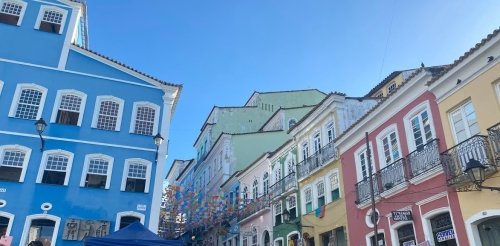Pitzer in Brazil Summer Program

The historic center of Salvador, Brazil
The Brazil Summer Program takes place over six weeks in Salvador, Bahia, Brazil. The city is an UNESCO World Heritage site, the capital of Bahia State, the first colonial capital of Brazil, and the center of Afro-Brazilian culture. The Pitzer in Brazil Summer Program provides students an opportunity to engage with a city and region that has retained and celebrated its African roots. This summer program is run in collaboration with the Steve Biko Institute, a nationally recognized organization helping Black Brazilians enter and succeed in college settings.
Program Dates
- Late May – Early July
Eligibility and Prerequisites
- Students must be in good academic standing and have a 2.0 or higher GPA on a 4.0 scale
- Prior Spanish or Portuguese language study and/or coursework is recommended (note: students without a background in Portuguese will take a 2-3 week online introductory course in the spring semester)
- This summer program is open to Pitzer and students from other undergraduate colleges
Courses & Credits
| Course | Claremont Credits | Semester Credits |
| Core Course: Brazil in the Bahian Context | 1.0 | 4 |
| Intensive Portuguese | 1.0 | 4 |
| TOTALS | 2.0 | 8 |
Program Information
Core Course
This course provides an overview of the history, culture, and society in Brazil with a particular emphasis on community and race in the state of Bahia and the city of Salvador. The course includes lectures by local faculty and specialists from non-governmental organizations and community leaders, site visits, and reading and writing assignments that allow students to explore a variety of topics in Salvador, including but not limited to, the legacy of colonialism and slavery in Brazil, health care, political structures, women’s issues, and environmental issues. A strong community engagement with young former Biko students and the extended family stay for the duration of the program is an important part of the course, providing context to the ideas presented in the core course.
Intensive Portuguese Language Class
For students without a background in Portuguese, preparation for the program begins in Claremont during the spring semester with 2-3 weeks of virtual introduction to the Portuguese language. Once in Brazil, Portuguese will be offered at the introductory and intermediate levels through local language faculty. With a maximum of six students per teacher, the course employs a highly communicative, interactive curriculum that emphasizes both spoken and written Portuguese and is closely connected to the family stay experience, the core course, and other field activities. Students attend language classes for 12 to 14 hours a week for a total of roughly 60 hours of in-class instruction.
The heart of the Pitzer in Brazil summer program is the homestay with a local family. Through your host family, you have the best opportunity to be incorporated into the social fabric of the local community. Our criteria of selection are primarily based on the family’s willingness to open their homes to our students and make our students feel like members of the family. Students will have their own bedroom and only one student is placed in each home to maximize the use of Portuguese.
To deepen students’ understanding of topics covered in the core course, students participate in activities and study trips in or near Salvador. Past activities and study trips have included:
- Soccer matches (at one of the World Cup stadiums)
- Dance sessions
- Drums workshops
- Visiting the Baroque city of Cachoeira
- Visiting Quilombo Ilha, an Afro-Brazilian settlement established by escaped slaves in Brazil
- Itaparica Island off the coast of Bahia
How to Apply
Application Steps and Deadlines for Pitzer College Students
Application Steps for Non-Pitzer Students
Before You Go
Passport: Everyone on the program needs a passport. Check the expiration date. If you do not have a passport valid for six months after your planned return from study abroad, then you will need to renew your passport.
Orientation: After students apply and are accepted into the program, they will participate in a program orientation before leaving for Brazil. Orientations are required and designed to ensure students get the most out of the study abroad experience. They provide cultural context, health and safety information, and academic guidelines. At orientation, students will receive details specific to the program including program dates, flight arrangements, immunization documents, safety guidelines, and the handbook. Also at orientation students will receive details regarding the virtual Portuguese language courses.
Summer Program Fees: The 2025 comprehensive fee for Pitzer Direct-run Summer Abroad programs has been set at $12,500. The cost covers tuition for two courses, all program activities and study trips, full room and board, and round-trip flight. Financial Aid will be available for Pitzer College students who normally receive financial aid. Students receiving aid should contact the Financial Aid office for details on how their package could be applied to a summer program.
Visas: Currently U.S passport holders do not need a visa for entry into Brazil if the trip is under 90 days. However on April 10, 2025, the Government of Brazil will reinstate a visa requirement for all U.S. nationals visiting Brazil, with an option for an e-visa for qualified applicants. Additional information will be provided to students at the program orientation. Students are also encouraged to stay updated by checking the Brazil eVisa Website.